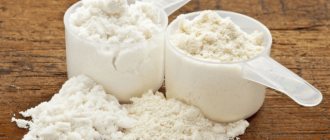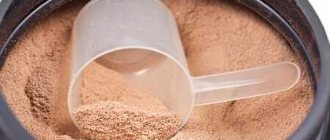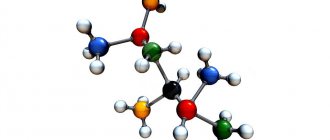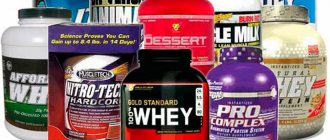Whey protein: what is it and how is it made?
Whey protein is an all-natural protein supplement that is used for muscle gain, weight loss, strength gain, and more.
Whey protein is obtained from milk during cheese making. By curdling milk, two parts are obtained: curd (casein) and whey (liquid). The whey part of milk contains only 20% protein, which is not very convenient for use, so the whey is dried, i.e. The water is separated and ultrafiltration is carried out. After which, the amount of protein reaches 80-95%. In this way, carbohydrates (including lactose), fats, and water are separated and almost pure whey protein is obtained. It is the most popular protein among athletes. Whey was previously considered a waste product of the dairy industry for decades. Now whey protein is rated higher than egg, casein and soy, as well as other animal proteins. It has the highest biological value (1). Whey protein is globular with the main components being β-lactoglobulins (35-65%) and α-lactalbulins (12-25%). Minor ingredients include immunoglobulins (8%), serum albumin (5%) and lactoferrin (1%) (Smithers et al. 1996). This protein is a rich source of branched chain amino acids BCAA (leucine, isoleucine and valine), essential amino acids (cysteine) and peptides (Hulmi et al. 2010).
High in leucine (50-75% higher than other protein sources) and plays a key role in regulating skeletal muscle protein synthesis (Chen et al. 2014). It is also rich in the amino acid cysteine, a precursor of glutathione, a non-enzymatic thiol antioxidant that is obtained through diet (Bell 2000). Glutathione plays a key role in immunity by reducing oxidative stress, regulating cellular processes whose imbalance can trigger disease (Trachootham et al. 2008).
Protein: contraindications
A lack of protein in the body leads to negative consequences, but for some people it is still contraindicated. Those who have:
- Kidney failure and other kidney diseases.
- Genetic predisposition to kidney disease.
- Individual intolerance to components.
Can protein harm the body? Of course yes. Like most other products, protein has its contraindications. It also has its own consumption characteristics. Therefore, care should be taken to minimize the negative impact
People who have diseases of the gastrointestinal tract, liver or kidneys should consult their doctor before using protein mixtures. This also applies to people who are lactose intolerant, suffer from diabetes and pancreatitis. The main thing is to control the dosage of protein.
Under normal conditions, a person requires 1 g of protein per 1 kg of weight.
Because whey protein is made from milk, it cannot be consumed by those who are lactose intolerant.
Some of the amino acids in whey protein may also cause intolerance to this product. And if you are lactose intolerant, the consequences can be serious.
For example, many people get a skin rash when they first open a can of whey protein. Tiny particles of dusty whey protein released into the air can cause an allergic reaction on the skin, resulting in a rash.
Kidney diseases
If you consume large amounts of whey protein over a long period of time, you may be at risk of developing kidney disease, including kidney stones. People with existing kidney disease are at greater risk of developing stones and, in severe cases, kidney failure.
Gastritis
If, after consuming a protein mixture, symptoms of gastritis appear, you should try not taking cocktails for several days. This will help determine whether the protein is causing your symptoms to worsen.
Protein does not harm people with heart and vascular diseases. On the contrary, protein reduces the amount of cholesterol in the blood. Which has a positive effect on both the heart and the elasticity of blood vessels.
Additive replacement

There are a large number of products on the sports nutrition market that will allow you to replace the supplement without harm to health.
For example, whey protein isolate contains less lactose. This product can be tried by those who are lactose intolerant.
If eating protein causes you to experience flatulence, then you need to take specialized enzymes. The best remedies in this case are Pancreatin or Abomin, as they have a high protease content. They improve digestion and eliminate this unpleasant problem.
Taking specialized enzymes is not harmful to health.
Protein does not pose any particular harm to the health of the body. The main thing is to find a balance in taking this sports nutrition. If you find the right dosage of protein specifically for your body, you can say with confidence that protein shakes will do you more good than harm.
For what purposes is it used?
- Gaining muscle mass. This protein is ideal for this purpose because it contains a large amount of essential amino acids and l-leucine, which is responsible for protein synthesis (recovery and muscle building) as we said earlier;
- Weight loss or fat burning. Whey contains a low amount of calories, which is perfect for this purpose. In addition, it copes well with suppressing appetite, as well as meeting the daily requirement for protein;
- Meal replacement. People who want a healthy snack choose whey protein, most often these are girls. The advantage is that cooking is unnecessary, as well as the delicious (sweet) cocktail.
Protein composition
The composition of the protein varies depending on the type of supplement. Whey protein consists of globular proteins that are obtained during the production of cow's milk. Milk consists of casein, whey and other protein components such as immunoglobulin, alpha-lactalbumin, glutamine, etc.
Soy protein consists of 55-60 percent amino acids, of which more than 30 percent are glutamine and lysine. There are also vitamins and minerals.

Protein complexes contain carbohydrates, fats, minerals and trace elements.
Types of whey protein:
- Whey concentrate is a protein that has undergone conventional ultrafiltration and reaches 80-85% protein. The cost of such protein is quite reasonable. The absorption rate is fast. Contains a small amount of lactose, so it is not suitable for people with very poor lactose intolerance.
- Whey protein isolate is a more detailed filtration that achieves about 90-95% protein. The isolate usually does not contain lactose, which allows it to be consumed even by people with severe lactose intolerance. The absorption rate is very high. The number of calories is lower than in concentrate, and the cost is significantly higher. Its best use is on a diet.
- A mixture of concentrate and isolate. This is a very common occurrence at the moment. It turns out to be an average product in terms of characteristics and price range.
- Whey hydrolyzate is not a degree of filtration as in previous types. Hydrolyzate is a fermentation method (hydrolysis) in which protein is broken down into amino acids and peptides (several amino acids connected to each other). This makes this “protein” as easily and quickly digestible as possible, which almost does not linger in the stomach. Judging by studies, the rate of absorption of amino acids from hydrolysis is faster than from amino acids in free form. It is quite expensive and it is advisable to use it only for elite athletes, for whom every millimeter of the result is important. It also comes in different degrees of purification: concentrate or isolate.
Varieties
Whey protein is the name of a product group. These types of whey protein are the most common on the market:
- Classic protein. The ratio of pure protein is about 70%. Cheapest source. It is not a commercial success due to weak advertising.
- Whey prot. The ratio of pure protein is about 85%. It is actively advertised by manufacturers as the coolest, most sophisticated and effective - because of this, it is more expensive than KSB and classic. Sold only in small packaging. Effective, but expensive.
- KSB prot. The ratio of pure protein is about 80%. Cheapest source. Commercially unsuccessful due to weak advertising.
- Isolate. The ratio of pure protein is about 90%. Unjustified consumption of protein. Needed only for bodybuilders-chemists who clearly calculate the fermentation and intake of a pure product, monitoring the calorie intake down to 1% of consumption.
- In complexes. The ratio of pure protein is about 50%. Used in gainers and complex proteins. Efficiency is low.
Whey Protein Dosage
For an ordinary person who does not engage in sports, the WHO recommendation is 0.66 g. up to 0.8 gr. protein, but at the moment there is scientific evidence confirming that increased protein intake of 1.2-1.6 g. promote healthier aging (2). For people who want to achieve certain goals, we will consider below: Gaining muscle mass. Here the optimal range is 1.4-2.0 g. protein per kg. pure human muscle mass. (4) Weight loss/weight loss. Dosages here vary depending on sports activities and the desire of the person. It is better for people with strength training to maintain muscle mass to consume 3.4 grams (3), but not every person can afford this, so you need to maintain at least 1.5 grams. If a person does not play sports, then the recommendations can be reduced from 1.5 grams. at least up to 2g. squirrel. Increased strength, speed, power. Here the optimal dosage is from 2 g. up to 2.5 gr. protein. It is important not only to restore muscles, but also tendons and ligaments.
Soy protein: harm or benefit?
Soy protein is a vegetable protein, the benefits and harms of which are also widely discussed in the sports world.
According to numerous data obtained by researchers, soy protein is ranked the worst among all types of proteins.
Harm
Low-quality soy protein is not completely absorbed by the body. Unfortunately, today a very large amount of soy protein is produced without meeting technological requirements. And the quality directly depends on the degree of processing. Soy also contains inhibitors - substances that slow down the work of internal enzymes responsible for processing proteins. As a result, processing slows down and absorption takes longer than necessary. The problem is solved by industrial purification of the soy product.
Soy contains substances of plant origin - phytoestrogens. They are similar in structure to female hormones and act in a similar way. The consequences are a decrease in testosterone levels, excess weight gain, stimulation of tumors present in the body.
According to some reports, soy protein causes negative effects with long-term use. We must remember that soy protein is made from a genetically modified base, and for many this is a red line that they cannot cross. And they do it right.
Soy protein performed poorly compared to other types of proteins. Therefore, this fact alone should prompt one to refuse to take it.
Benefits of Soy Protein
If low price can be called an advantage of soy protein, then so be it. However, you shouldn’t chase cheapness; it’s better to spend an extra 100 rubles than to spend thousands later on restoring your health.
Soy protein contains lecithin, which is involved in the regenerative processes of brain cells and slows down the aging process in the body.
Soy protein has a slightly less negative effect on the kidneys. It can be used by people who have pathologies of the urinary system.
Soy protein causes an increase in the level of thyroid hormones, which has a positive effect on the fight against excess weight. Also, according to some data, soy protein has a positive effect on the thyroid gland.
Soy protein should be taken by those who need to feel full for a long time: those losing weight, vegetarians, athletes immediately after finishing a workout. However, you will not be able to increase muscle mass this way. It is better to combine the complex with proteins of animal origin.
If you are not sure about the benefits of soy protein, then it is better to avoid consuming it. Some people feel disgust at the mention of this word alone.
100% Whey Protein: indications and contraindications
RECOMMENDED for nutrition of athletes during periods of intense physical activity as a source of protein, carbohydrates, and vitamins.
CONTRAINDICATIONS:
Individual intolerance to the ingredients of dietary supplements, pregnancy, breastfeeding, persons under 18 years of age and the elderly, increased nervous excitability, insomnia, high blood pressure, cardiac dysfunction, severe atherosclerosis. It is recommended to consult a doctor before use.










